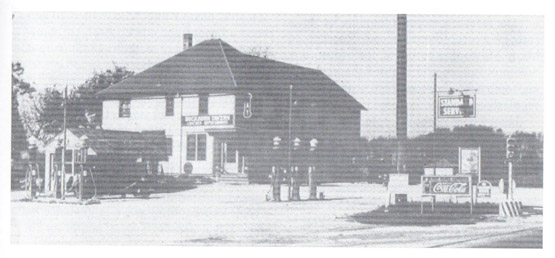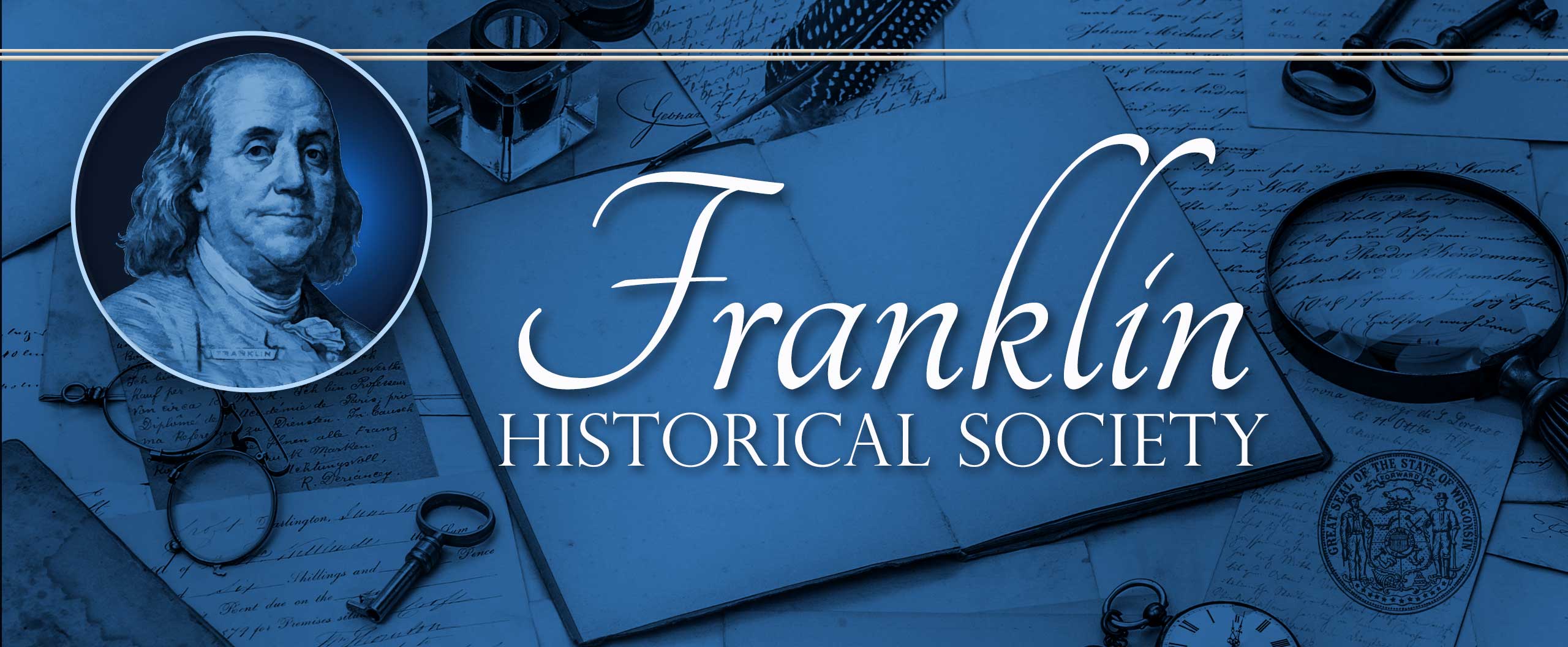The Buckhorn Tavern – A Long and Colorful History
By Judy (Nitz) Scherrer
For Sale — 1.24 acres — Commercial Property.
The realty sign at the northwest corner of Hwy. 100 (Ryan Rd.) and 27th St. is another reminder of changes for the old Buckhorn Tavern in Franklin. Facing an uncertain future, the business is one of two buildings on the corner that remain of what was known as the Painesville community, an area that long ago included parts of Franklin and Oak Creek. The sign tells nothing of the Buckhorn’s role in the history of the area, a history that dates back to the mid-1830s when the business started and to the mid-1840s when records show the land being purchased from the government when John Tyler was president.
 Because the Buckhorn was located at the crossroads of two main wagon trails, the tavern greeted many a weary traveler and provided farmers and other visitors with food, drink and shelter. Sheds were provided for horses as well. People who stopped were a good cross section of frontier settlers and hard working people. Miners hauling lead ore from Platteville to the smelters in Green Bay stopped for a hot meal and a place to sleep. Farmers from the prairie country around Union Grove stopped on their way to the Milwaukee Haymarket to rest their horses. Even at the turn of the century, many a winter day would find a dozen teams lined up in front of the tavern by 8 a.m. It was also a popular rest stop for cattle drivers who came in from Illinois, Indiana, and Ohio with up to 500 head of cattle in a drove. Because the Buckhorn was located on a major transportation route, it was a regular stop for the stage between Milwaukee and Chicago. Many Milwaukee notables, including Solomon Juneau and Byron Kilbourn, are reported to have stopped at the tavern regularly.
Because the Buckhorn was located at the crossroads of two main wagon trails, the tavern greeted many a weary traveler and provided farmers and other visitors with food, drink and shelter. Sheds were provided for horses as well. People who stopped were a good cross section of frontier settlers and hard working people. Miners hauling lead ore from Platteville to the smelters in Green Bay stopped for a hot meal and a place to sleep. Farmers from the prairie country around Union Grove stopped on their way to the Milwaukee Haymarket to rest their horses. Even at the turn of the century, many a winter day would find a dozen teams lined up in front of the tavern by 8 a.m. It was also a popular rest stop for cattle drivers who came in from Illinois, Indiana, and Ohio with up to 500 head of cattle in a drove. Because the Buckhorn was located on a major transportation route, it was a regular stop for the stage between Milwaukee and Chicago. Many Milwaukee notables, including Solomon Juneau and Byron Kilbourn, are reported to have stopped at the tavern regularly.
Since there was no post office in the area, one was established at the Buckhorn Tavern in April of 1868. The big day of the week at the tavern was when the mail was picked up by the owner’s son from the Oakwood Railroad Station — in Oak Creek — and brought to the tavern. In these mail sacks were the weekly newspapers. While few farmers received many personal letters, most subscribed to a newspaper. On “paper day,” they hitched up their teams of horses and drove to the tavern to visit their friends and neighbors. Farmers would stand near the pot-bellied stove to let their frozen clothing thaw out and as it thawed, the room filled with the smell of moisture from the drying of that wool clothing. Those vapors, coupled with the heavy tang of lager beer, tobacco smoke from pipes, and the ever-present aroma of manure on boots, gave a distinct flavor to the tavern that would long be associated with the “weekly paper”.
There have been many stories that have been told through the years about what it was like at the Buckhorn. One of these stories recalls how the tavern got its name. In 1899, one of the owners was shooting his gun from an upstairs window and in the process, killed a buck. He later mounted the antlers near that window — hence the name “Buckhorn Tavern”. Another former owner had an interesting habit that made him very well known. Every morning when he arose, he would wash up at the wooden pump outside — even when the icy Arctic winds were blowing! A very alarming incident occurred in October of 1926 and was reported in a Milwaukee newspaper under the headline “Roadhouse Keeper Slain”. It told the story of the killing of the Buckhorn proprietor by a bandit who fled with money from the cash drawer. Prior to the slaying, the bandit had been at the tavern several times that evening and, to avoid suspicion, kept buying cigars. He reentered at midnight and whipped out a long-barreled blue steel pistol. The owner tried to shoot the bandit with his own gun, but the bandit shot first. The owner died in front of his wife and while his young son slept in a nearby room. The bandit fled with $20.00 in his possession.
In the 1920s to 1930s during Prohibition, bootleg beer was brought from Chicago to the Buckhorn and kept outside in the back of the building. Later, as years went by, government agents often came in to check on the prices of items being sold. According to price controls at the time, the Buckhorn was charging 5 cents too much for a cheese sandwich. The owner more or less ignored the findings because he felt that he had given away so many sandwiches to servicemen in the past that no further price adjustments needed to be made. Dinners at the Buckhorn cost about 95c and cigarettes were 25c a pack. In addition to food and drink motorists could also buy gasoline at the price of 5 gallons for $1.00 — the only thing was it had to be hand pumped into the glass tank before opening the nozzle to fill the car! The Buckhorn also had slot machines in the back room — even though they were not supposed to have them! Workers told stories of always sticking a few coins in the machines the first thing in the morning before they began their work shifts.
The original Buckhorn was torn down in 1906 but was rebuilt using some of the original materials. It was then that it was discovered that wooden pegs were used in the original construction. With its new front and large dance hall the Buckhorn became known as the social center for the community. On weekends, the building shook to the stomping of feet and the clapping of hands. Through the years the Buckhorn saw its share of functions — graduation parties, club meetings, 4-H activities, dartball leagues, and even costume parties! By 1932 the owners had to move the building back farther from the highway for the widening of 27th St — then Hwy 41. Business continued to thrive because of the heavy traffic going north from Chicago along old Hwy 41 and until the freeway system was built in the 1960s. In 1962, lightning struck the building and the sign that was in front was destroyed. It was a neon sign in the shape of a running deer. That, along with the gas pumps and the post office are no longer a part of the Buckhorn. What remains today is a business that traces its beginnings back to the Painesville community, another hamlet within the old Town of Franklin that existed along transportation routes of an earlier time.
– Judeen Scherrer

